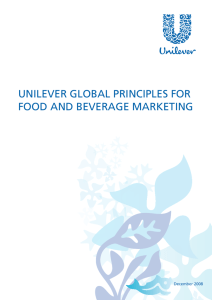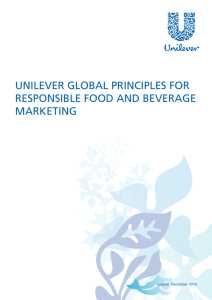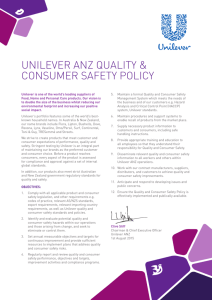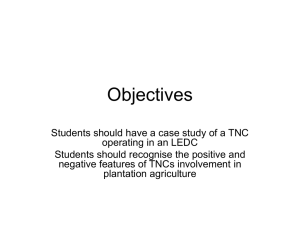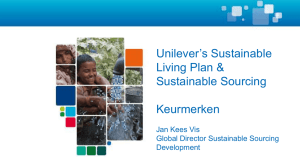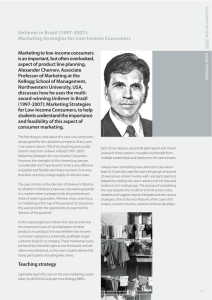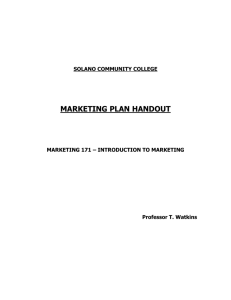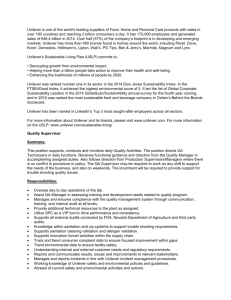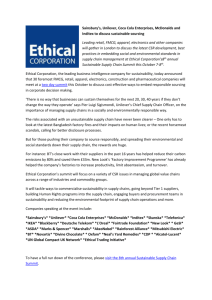unilever marketing and advertising principles for responsible food
advertisement
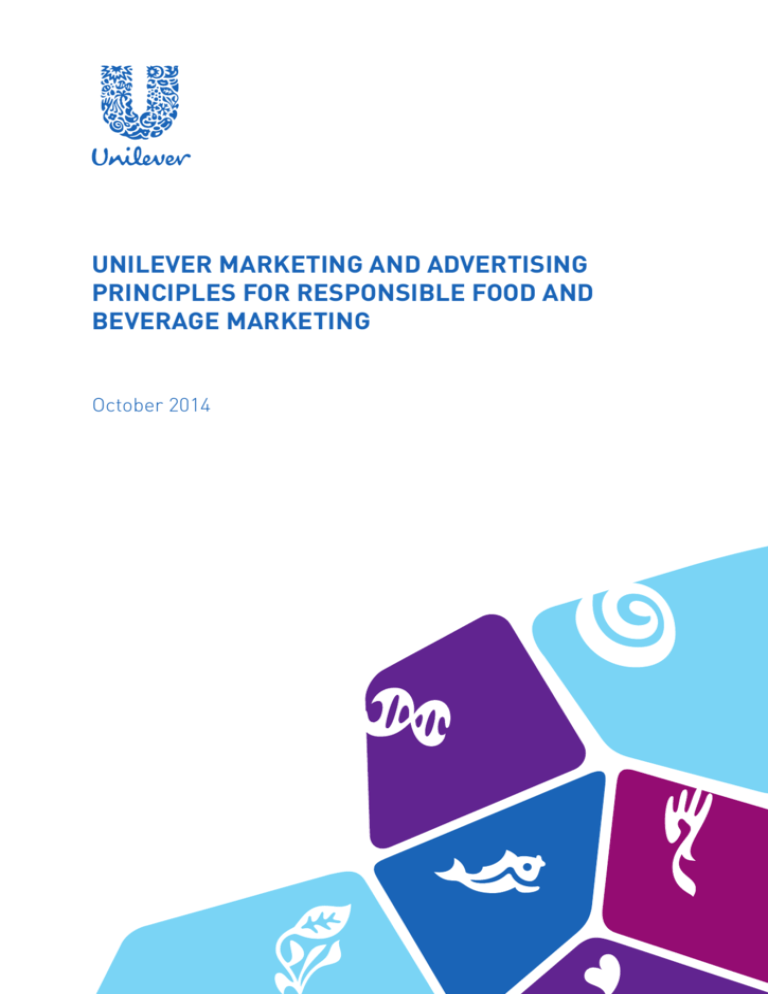
UNILEVER MARKETING AND ADVERTISING PRINCIPLES FOR RESPONSIBLE FOOD AND BEVERAGE MARKETING October 2014 UNILEVER MARKETING AND ADVERTISING PRINCIPLES FOR RESPONSIBLE FOOD AND BEVERAGE MARKETING The following global Principles are applicable to all of Unilever’s food and beverage marketing activities and communications. These marketing activities and communications include but are not limited to: packaging and labelling; in-store activities including closed circuit television ads; consumer, trade/sales and professional promotions and public relations materials; all forms of advertising and marketing including but not limited to television, radio, internet (both company own websites and third party websites), social media, apps, online games and direct marketing; and all other forms of communication (e.g. cartoon characters, product placements, advergaming, free gifts/toys, etc.). To determine if “marketing communications” are “directed to children” we will take into account the placement (e.g. media audiences – where over 35% of the audience are children, below the age of 12) and the content of those communications. Marketing communications must comply with all relevant laws/regulations in the local country. These Principles are in line with the International Chamber of Commerce (ICC) framework for Responsible Food and Beverage Marketing Communications (2011). In addition, national and local self-regulatory organisations (such as national advertising associations, television network approval guidelines, etc.) which have self-regulatory standards or codes of conduct must be considered. GENERAL PRINCIPLES All food and beverage marketing communications must be truthful and not misleading. In addition to existing legal requirements and obligations, Unilever will adhere to the following General Principles in all food and beverage marketing communications: 1. We will strive to communicate about how our brands and products fit into a healthy diet and healthy lifestyle. 5. In marketing communications representing meals, the foods portrayed should be shown in the context of a balanced diet. 2. Copy, sound and visual presentation of food products should accurately represent any material characteristics advertised and should not mislead consumers concerning any of those characteristics. 6. Food and beverage marketing communications should not undermine and where possible should encourage the promotion of healthy, balanced diets. 3. Nutrition and health benefit claims should have a sound scientific basis. 4. Food and beverage marketing communications should not encourage or condone excess consumption and portion sizes should be appropriate to the setting portrayed and the intended consumers. 7. Food and beverage marketing communications should not undermine and where possible should encourage the promotion of a healthy, active lifestyle. 8. Food products not intended to be substitutes for meals should not be represented as such. ADDITIONAL PRINCIPLES FOR RESPONSIBLE FOOD AND BEVERAGE MARKETING COMMUNICATIONS DIRECTED TO CHILDREN The General Principles apply to all marketing communications, including those directed to children. However, given the limited ability of young children to understand marketing messages and/or concerns about rising levels of obesity and overweight in many countries around the world, Unilever will ensure: 1. No marketing communications will be directed to children who are younger than six (6) years of age. 2. All marketing communications directed at children between six (6) and twelve (12) years of age will meet Unilever’s Nutrition Criteria*. In addition, we will promote fun and active lifestyles as part of our marketing campaigns. Principles 1 and 2 above include all product packaging/labelling and point of sale materials. We will ensure that 100% of our products globally will be compliant with this extension by the end of 2014. 3. By the end of 2014 all our children’s ice creams will contain 110 kilocalories or fewer per portion. 4. Licensed or non-licensed cartoon characters and celebrities appealing to children aged between 6 and 12 will only be used on and in association with products which meet Unilever’s Nutrition Criteria. Any existing products will be reformulated to meet Unilever’s Nutrition Criteria by the end of 2014. 5. No promotion of brands or products in primary schools. This does not include displays, charitable fundraising activities, public service messaging, sales or advertising directed to school administrators. Where specifically requested by, or agreed with, the school administration, Unilever may participate in campaigns for educational purposes. This only applies to brands and products which fulfil the requirements established under Principle 2. 6. Marketing communications should not mislead about potential benefits from the consumption of a product, such as status or popularity with peers, sports success, and intelligence. 7. Marketing communications should not include any direct appeal to children to persuade their parents or other adults to buy advertised products for them. 8. Food product marketing communications should support the role of parents and other appropriate adult role models by providing guidance on the nutritional profile of products. 9. Marketing communications directed towards children should not create a sense of urgency, or price minimisation, for example, by using words like ‘’now’’ and ‘’only’’. 10. While fantasy, including animation, is appropriate in marketing communications with children, care should be taken not to exploit a child’s imagination in a way that can encourage poor dietary habits. 11. Marketing communications should not exploit the inexperience or credulity of children or young people. Sales promotions should be presented in such a way that children and parents are made aware before making a purchase of any conditions likely to affect their decision to purchase. 12. Products derived from or associated with programme content primarily directed to children should not be advertised during or adjacent to that programme. 13. Broadcast or print media personalities (live or animated) should not be used to sell products, premiums or services in a way that obscures the distinction between programme or editorial content and commercial promotion. For example, commercials or advertisements featuring characters from programmes or publications primarily directed to children should not be adjacent to programmes or articles in which the same personality or character appears. 14. No products, except those that meet Unilever’s Nutrition Criteria, will be placed in the content of a programme directed to children aged between 6 and 12 for purposes of promoting sale of such products. MONITORING AND ENFORCEMENT We will ensure that these Principles are globally communicated to, and implemented by, all relevant functions (e.g. Marketing, Legal) as well as our agencies and suppliers. We will regularly report on compliance with these Principles through an independent verification system. * This provision excludes bouillons, seasoning and mustard. The content of marketing communications for these products will only be directed towards adults. Unilever N.V. Weena 455 3013 AL Rotterdam The Netherlands T +31 (0)10 217 4000 F +31 (0)10 217 4798 Commercial Register Rotterdam Number: 24051830 www.unilever.com Unilever PLC 100 Victoria Embankment London EC4Y 0DY United Kingdom T +44 (0)20 7822 5252 F +44 (0)20 7822 5951 Unilever PLC registered office Unilever PLC Port Sunlight Wirral Merseyside CH62 4ZD United Kingdom Registered in England and Wales Company Number: 41424

